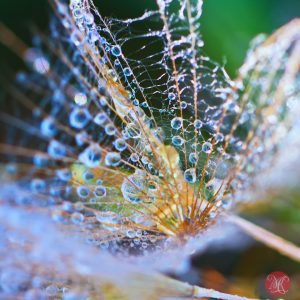 The Yogabliss, Two Rivers/River Tree Yoga on-line Moving into Meditation classes met this morning. I am so grateful to have this light. Yes – grateful for the screen through which I can see caring faces. Your faces help me to experience the goodness in human being. Our faces are blessings we offer each other. Thank you.
The Yogabliss, Two Rivers/River Tree Yoga on-line Moving into Meditation classes met this morning. I am so grateful to have this light. Yes – grateful for the screen through which I can see caring faces. Your faces help me to experience the goodness in human being. Our faces are blessings we offer each other. Thank you.
We shared a thanksgiving inspired by Kailea Frederick of Earth is Ohana. The thanksgiving was expressed by the poem, Remember, gifted by American poet laureate, Joy Harjo. If Joy’s work speaks to you check out her recent interview with the Chief Seattle Club at The Joy Harjo Bookclub on YouTube.
We contemplated the inner and outer resources we can draw on in these hard times. These same resources help us to be present with our difficulties while keeping our hearts open.
We also drew on the meditation teachings on equanimity as interpreted by Roshi Joan Halifax and Sharon Salzberg.
Relaxed Reflection
Remember is given to us by poet Joy Harjo – who is the 23rd U.S. Poet Laureate and the first native person to receive this title. The spirit of her work helps me to realize our connection beyond the separation we sometimes feel.
Remember the sky that you were born under
know each of the star’s stories.
Remember the moon, know who she is.
Remember the sun’s birth at dawn, that is the
strongest point of time. Remember sundown
and the giving away to night.
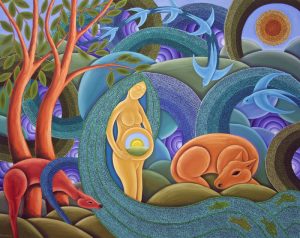 Remember your birth, how your mother struggled
Remember your birth, how your mother struggled
to give you form and breath. You are evidence of
her life, and her mother’s, and hers.
Remember your father. He is your life, also.
Remember the earth whose skin you are:
red earth, black earth, yellow earth, white earth
brown earth, we are earth.
Remember the plants, trees, animal life who all have their
tribes, their families, their histories, too. Talk to them,
listen to them. They are alive poems.
Remember the wind. Remember her voice. She knows the
origin of this universe.
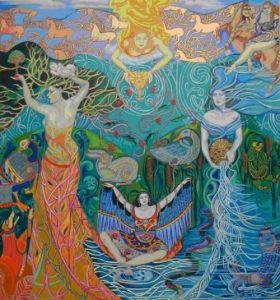 Remember you are all people and all people
Remember you are all people and all people
are you.
Remember you are this universe and this
universe is you.
Remember all is in motion, is growing, is you.
Remember language comes from this.
Remember the dance language is, that life is.
Remember.
What is remembering? Recalling? Reliving? Reminding? Who or what do we bring back to ourselves?
We can remember and feel the warmth of our hands. We can remember and feel our breathing. We can remember and experience our embodiment so intimately and feel ourselves part of all that is. This amazing vast universe manifesting in such wonder. We can respond to this feeling with reverence and we can also sense our smallness . . . our vulnerability.
When we practice mindfulness we enter the time and space in which all our humanness arises. With every practice, we learn to be there for ourselves. We learn to stay present with sensations, feelings, emotions . . . even now when it’s so easy to feel overwhelmed, anxious, lonely and sad. . . .
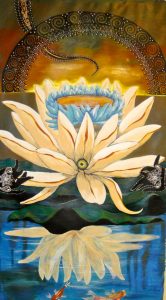 We can feel whatever we are feeling and remember our inner resources . . . We can remember we have eachother. We can remember we have the wondrous generosity of our living planet. Our awareness is a resource . . . Our kindness is a resource. . . . Our compassion is a resource . . . Our empathy and our joy in the happiness of others is a resource . . . Our equanimity – the stability of mind that allows us to be present with an open heart no matter how wonderful or difficult things are. All of these capacities – these resources – awaken by finding some tenderness for yourself, right here, right now . . .
We can feel whatever we are feeling and remember our inner resources . . . We can remember we have eachother. We can remember we have the wondrous generosity of our living planet. Our awareness is a resource . . . Our kindness is a resource. . . . Our compassion is a resource . . . Our empathy and our joy in the happiness of others is a resource . . . Our equanimity – the stability of mind that allows us to be present with an open heart no matter how wonderful or difficult things are. All of these capacities – these resources – awaken by finding some tenderness for yourself, right here, right now . . .
Tune in to what is real for you right now . . . see if you can relax and simply be open to sensing . . . feeling . . . thinking . . . what is happening right now . . . Can you feel your body breathing? Can you feel the sensations of your body resting on the earth? Can you notice how you meet what feelings might be surfacing? Just noticing . . . something pleasurable . . . something painful . . . Can you meet what arises with tenderness . . . kindly letting it be . . . If it’s difficult to find this inner kindness can you offer that struggle compassion . . . whatever tenderness you can . . . just letting it be there. We all need this tenderness right now . . .
In her article, Equanimity: The Fourth Abode, Roshi Joan Halifax asks:
 What kind of mind and heart can stay strong and open and not fall prey to conditioned reactions? Can we grieve fully and not cling to our grief? Can we feel the . . . pain and not cling to it? Can we be with the unknowable and open to trust at the same time? The mind that has realized the truth of change and the truth of cause and effect, what Buddhists call karma, can do this. Planting seeds of kindness, love, compassion, and joy helps us ride the waves of change without drowning.
What kind of mind and heart can stay strong and open and not fall prey to conditioned reactions? Can we grieve fully and not cling to our grief? Can we feel the . . . pain and not cling to it? Can we be with the unknowable and open to trust at the same time? The mind that has realized the truth of change and the truth of cause and effect, what Buddhists call karma, can do this. Planting seeds of kindness, love, compassion, and joy helps us ride the waves of change without drowning.
Living through times in which it’s easy to feel despair – joy might seem very distant. Yet we need joy so we don’t succumb to the suffering in our world. Is it possible to experience joy in the midst of suffering? Just this past week I learned of the deaths of two men who touched my life. I learned about both people – a young and an older man, through social media. This is how many of us learn about losing friends these days. Upon reading the words on a screen I felt as if my heart had been struck a blow. So many emotions have been bubbling up . . . including anger about living in a world where – like so many others – we aren’t able to attend memorial ceremonies to celebrate their lives and share our grief.
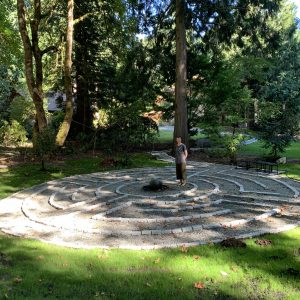 Walking through the woods in the early morning I began to think about the young man and how I had known him.
Walking through the woods in the early morning I began to think about the young man and how I had known him.
I remembered the times I was able to share yoga practice him.
I remembered his light witty sometimes self-deprecating sense of humor.
I remembered the amazing creativity he brought to his art and the way he lived his life. It was in these rememberings I began to experience a glimmer of joy.
I realized I can remember him – his beauty and his goodness. I can celebrate his life. I can create ceremony to honor this precious spirit by planting seeds of kindness, love and compassion in remembering.
This remembering helped me to find my way to the appreciative joy. I could recognize my friend’s goodness and take joy in it – a joy that isn’t bound by my heart alone. Perhaps when you find that you are heart struck you can find your own way to joy and share it with others. . . . Isn’t this also equanimity – our ability to hold suffering and joy at the same time?
In her On Being interview, Shelter for the Heart and Mind, Sharon Salzberg describes equanimity as peace. Not indifference. She says:
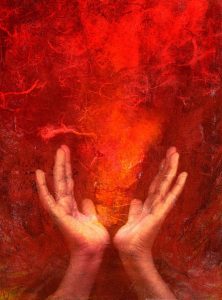 It’s such a huge capacity of our hearts, to see what we’re going through, to see what others are going through, and to just have this perspective of, there is change in life. And there is light in the darkness, and darkness in the light. And we’re not avoiding pain, because some things just hurt. That’s fundamental. But we’re holding it in a way that . . . it’s like the love is stronger than the pain, even. And the room we create, the environment we create, where all of this can come and go — it is, it’s built of awareness. It’s built of love.
It’s such a huge capacity of our hearts, to see what we’re going through, to see what others are going through, and to just have this perspective of, there is change in life. And there is light in the darkness, and darkness in the light. And we’re not avoiding pain, because some things just hurt. That’s fundamental. But we’re holding it in a way that . . . it’s like the love is stronger than the pain, even. And the room we create, the environment we create, where all of this can come and go — it is, it’s built of awareness. It’s built of love.
And it’s built of the sense of community; that we’re not so alone. And then we can really be with things, in a very, very different way.
Sharon has said that the most important thing she’s learned in her fifty years of practice is that healing is in the return. We “learn how to let go more gracefully . . . how to start over with some compassion . . . instead of judging [ourselves] so harshly . . .”
So here we are together – remembering to breathe in the midst of adversity. We’re remembering what matters most to us. We’re finding support in our inner strength and in one another. We’re learning to hold the hurts with a love that is stronger than the pain.
We remember to remember.
